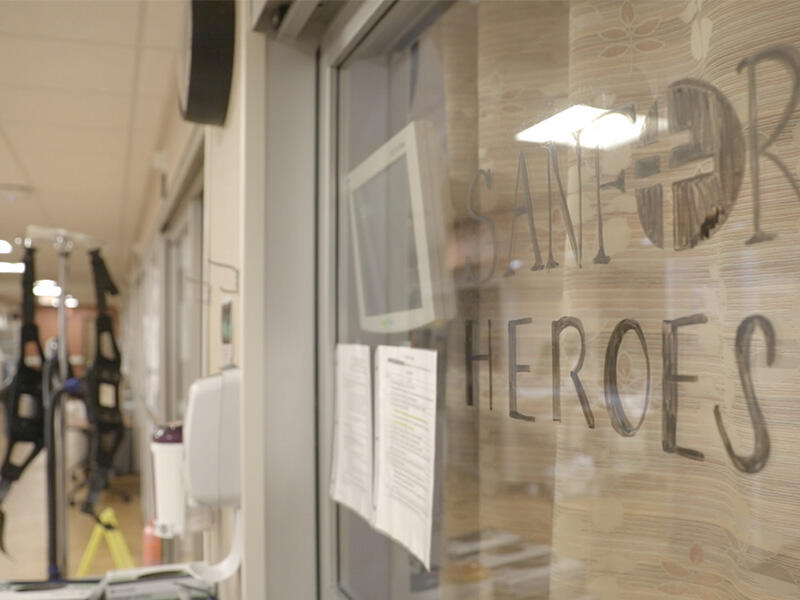If there was running list of often-used terms you’ve heard since March of 2020, “health care hero” would likely make it.
You’ve heard the term along with words like “unprecedented,” “uncertain” and many others.
At the height of the pandemic, the term “health care hero” meant one thing. But, if you ask leaders at Sanford Health, it’s now starting to mean something else.
Making sacrifices
Jeffrey Leichter, Ph.D, is a clinical psychologist and the lead administrator for behavioral health integration for Sanford Health. The term “health care hero” was frequently used to acknowledge the sacrifices caregivers have made during the pandemic, and honor their efforts.
“Health care workers in general, along with other critical workers, have had to step into roles and situations that none of us were really prepared for, (or) trained for. Every day was filled with uncertainty, worry, and anxiety.
“We know health care workers have a tremendous desire to serve others, and to be servant leaders. At times I think people were struggling with the conflict between wanting to serve, and at the same time, tremendous uncertainty about what that meant for risking themselves and indirectly their families as well,” he said.
Read more: Front-line workers recall one year of COVID-19
Clayton Van Balen, M.D., the Sanford Health medical director for employee health services and department chairman for acute care services in Sioux Falls, South Dakota, said health care providers are notorious for putting their needs aside to help others.
Dr. Van Balen says this type of behavior and dedication has been the long-standing expectation in the health care industry.
“The number of hours we put in is kind of like a badge of honor. You’re expected to put in very long hours and still be able to provide services to people. If you were tired, and had been up all night taking care of patients, then you’re expected to go back in the next day. That’s your badge of honor, if you want to call it that, that was expected of you,” he said.
He said he’s experienced this firsthand, countless times. Even during the birth of his own son.
“I can still remember when we had spent all night taking care of my wife. (We) delivered my son at about five o’clock in the morning. I get a call from the nurse saying we expect you to be here at seven. I’d been up all night with my wife, and I was expected to be in at seven, two hours after we just delivered my son.”
Caregiver fatigue and burnout
Dr. Van Balen says the field has been demanding for years, due to the nature of the work. The pandemic only exacerbated the demand, meaning caregivers have been operating at a consistently heightened level of intensity.
It only makes sense that providers would grow tired.
“When you put your needs on the back burner, for instance, people don’t get the breaks for their lunches. They don’t get to go to the bathroom when they need to. They don’t exercise like they should; they’re too tired. They’ve given every amount of energy they have. As a result, they too become tired. Their tank is empty,” he said.
Related: Healthy workplace for providers helps patients, too
Dr. Leichter said being in “go mode” constantly “can’t be the new normal, because people develop fatigue, both physical and emotional.”
“There’s a tremendous amount of grief associated with what’s gone on in the past year – the loss of patients, the economic and social impact on our country. When we look at psychological studies of how people cope with disaster, we realize they can only turn it up to the highest level for a certain period of time,” he added.
So, that’s why the term “hero,” often defined as someone with superhuman qualities, can actually act as a “double-edged sword,” according to Leichter.
“I don’t think anyone is going to challenge the idea that our health care teams have done extraordinary things. But, I think for me as a psychologist, the potential downside of referring to our health care team as heroes is that it diminishes their ability to ultimately ask for help, seek counseling, and to acknowledge their own limitations and vulnerabilities.
“I think of Wonder Woman or Superman being heroes. We don’t ever see Superman sitting in a therapist office saying, ‘Man, that was a tough day,’” he said.
Self-care for caregivers
Clinical neuropsychologist Marie Schaaf Gallagher says focusing on ourselves is more critical than ever.
“Now is our time to really focus back in on our self-care, because we are still human and we are vulnerable to burnout. We’re vulnerable to longstanding troubles if we don’t take care of ourselves now.
“During times of stress, we have to bump up that self-care even more than normal, because we can’t take care of anybody else if we haven’t been taking care of ourselves,” she said.
She adds that acknowledging mistakes, and looking upon them with grace can be helpful in later providing better care.
“I find when I share stories with my patients of how I am fallible and how I do self-care, that means more than anything else I might teach them or share with them. Human connection is really important, and self-care cannot be overstated by any means.”
And, that’s what makes a great hero.
“It’s the hero who knows when to stop and do something different. It’s the hero who knows when to step in to make a difference. The hero who knows their faults and weaknesses. I love the superheroes who can work together. Some of them have really weak spots, but they also know that their fellow superheroes can cover for those spots.”
Learn more
- ‘Psychological PPE’ resources offered for front-line workers
- Employee encouragement at Sanford, Good Samaritan Society
- Managing mental well-being after COVID-19 quarantine
…
Posted In Behavioral Health, Bismarck, COVID-19, People & Culture, Sioux Falls, Wellness

